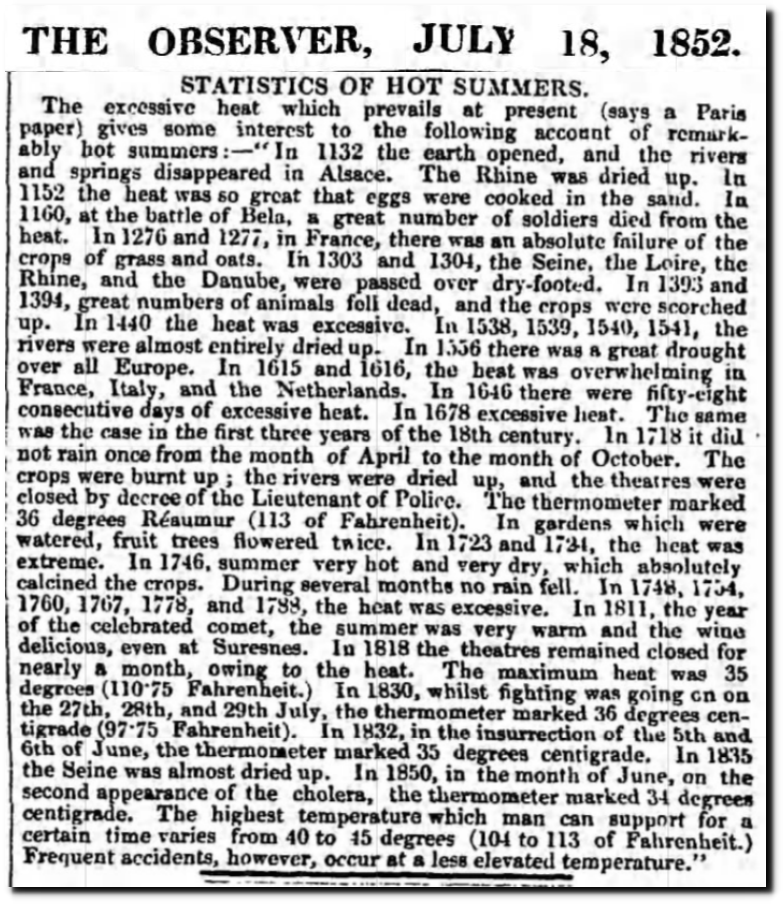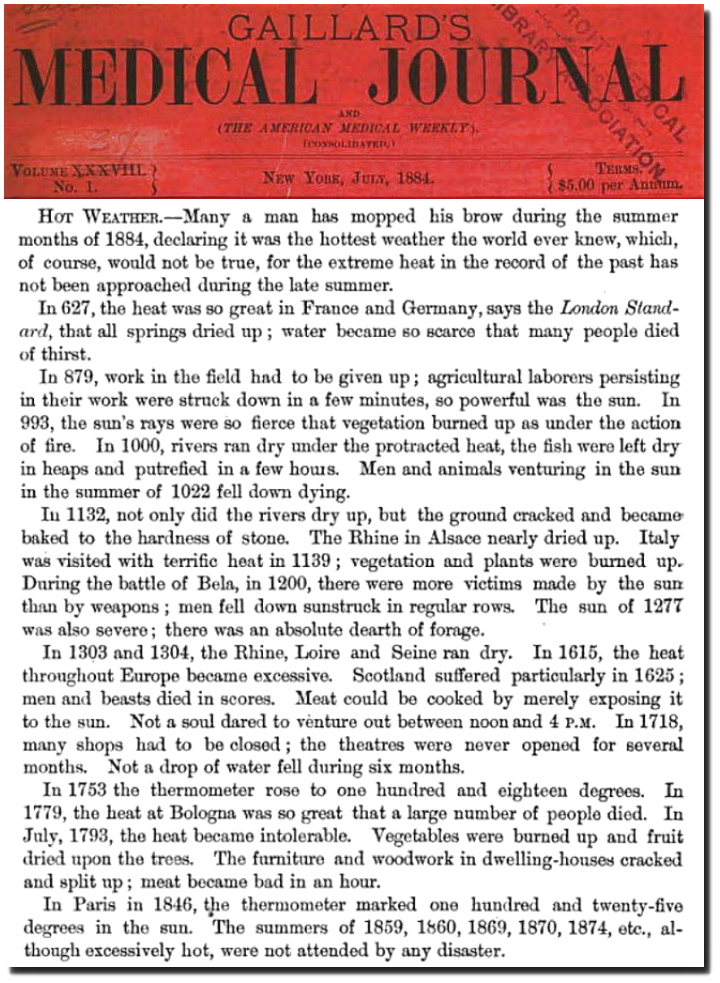Thursday, 31 August 2023
Tuesday, 29 August 2023
Google and Facebook do not want you to see this
Google does not want you to see this, just like it hid eminent epidemiologists who scorned lockdowns and masks. Facebook told me it would appear lower in my feed as it partly contains misinformation. One scientist recently said climate.change denial should become a criminal offence.
The Justified Sinner is still extraordinary thirty years later
I am rereading the Private Memoirs and Confessions of a Justified Sinner, by James Hogg, which is extraordinarily good. You never read the same book twice because you become a different person. Still this wonderful, extremely modern novel (written in 1821) is probably as good as I remember. In my twenties I thought it the best novel written in English, and it might be, beating even Conrad.
But can any novelist beat Miss Austen?
It's like a meteor from outer space embedded in the canon of great novels.
Like Brideshead Revisited or The End of the Affair, it might even convert a reader to Catholicism.
Hogg was a shepherd. I think Sir Walter Scott adopted him informally and had him taught to write, but I might be wrong about this.
It's the first thriller. Much better than anything by Scott, whose protégé Hogg was, better than Dickens and very exciting.
It's a psychological thriller and eviscerates Calvinism.
I said this to a nice woman in Glasgow Cathedral with an English (Edinburgh Morningside) accent and added 'You're not a Calvinist are you? One has to be so careful what one says in Scotland.'
'No I'm not, but one has to be so careful everywhere. Stop the world I want to get off!'
'I have stopped the world and got off. I live in Romania.'
'Oh you are very lucky!'
Yes, I really am. Romania is an outpost of civilisation in a world ruled by barbarians.
Thursday, 24 August 2023
Paganism takes back the lands it lost
I just visited St Mary's Episcopalian (Anglican) Cathedral in Edinburgh, built by Sir Gilbert Scott, who here builds a rather fine cathedral from scratch rather than ruining mediaeval ones.
In a bookshop I dipped into a book on the rise and fall of Christianity in Ireland. I had not remembered how many dreadful things priests and nuns did.
Kindness can go too far
"It's a little embarrassing to have been concerned with the human problem all one's life and find at the end that one has no more to offer by way of advice than 'Try to be a little kinder.''"
Aldous Huxley, "Moksha: Writings on Psychedelics & the Visionary Experience".
The British are much kinder than forty years ago, but I start to think they are too kind. That's the problem.
Thursday, 10 August 2023
Quotations
“Why you fool, it's the educated reader who CAN be gulled. All our difficulty comes with the others. When did you meet a workman who believes the papers? He takes it for granted that they're all propaganda and skips the leading articles. He buys his paper for the football results and the little paragraphs about girls falling out of windows and corpses found in Mayfair flats. He is our problem. We have to recondition him. But the educated public, the people who read the high-brow weeklies, don't need reconditioning. They're all right already. They'll believe anything.”
C.S. Lewis, That Hideous Strength
Wednesday, 9 August 2023
Quotations
Marcus Aurelius
"To be silent the whole day, see no newspaper, hear no radio, listen to no gossip, be thoroughly and completely lazy, thoroughly and completely indifferent to the fate of the world is the finest medicine a man can give himself."
Henry Miller
Monday, 7 August 2023
Saturday, 5 August 2023
'History is indeed little more than the register of the crimes, follies, and misfortunes of mankind' (Gibbon)
As this terrible war drags on it is hard to know what is happening but it is obvious that Ukraine is not doing well, which is hardly surprising given Russia's size and power, and that the war could go on for decades. Also obvious are the mistakes made by American presidents starting with George W. Bush in 2008 at the Bucharest NATO conference and in 2013-14 the involvement of the Americans in trying to overthrow the democratically elected government of Yanukovych, which was backed by 70% of the Ukrainian population in the last opinion poll before he fled.
Do they read no history? When did sanctions ever overturn a government? Why are the Americans doing untold harm by sanctions against Syria, for heaven's sake? To hurt Iran but Iran is not a threat. Or sanctions against Iran herself, Cuba absurdly, the Taliban in Afghanistan or Venezuela? Why?
'NATO exists to manage the risks created by its existence'
Thursday, 3 August 2023
Anti-democratic Britain
"Britain’s deranged war on cars, our looming ban on gas boilers, the debanking scandal, the failure to prosecute crime, the attempted cancellation of women, the sabotage of the Brexit agenda, the scale of migration: welcome to anti-democratic Britain, where the beleaguered majority is increasingly subject to the whims of an entitled, activist elite that often seems to despise the people over which it exercises so much power...." (Allister Heath today in theDailyTelegraph).
The elite has done this since the 1950s when the Conservative governments ignored popular fury about immigration. (The UK was virtually all white in 1950.) Later the city centres were destroyed and replaced with brutalist architecture. We joined the EEC ('the Common Market') despite the public opposing it. These three changes transformed the country - only one could be undone, after 43 years and after our country had been transformed by European laws and ideas.
'Statistics of Hot Summers'
“STATISTICS OF HOT SUMMERS.
The excessive heat which prevail. at present (says a Paris paper) gives some interest to the following account of remarkably bot summers :—” In 1132 the earth opened, and the rivers and spring; disappeared in Alsace. The Rhine was dried up. In 1152 the heat was to great that eggs were cooked in the sand. In 1160, at the battle of Bela, a great number of soldiers died from the heat. In 1276 and 1277, in France, there was an absolute failure of the crops of grass and oats. In 1303 and 1304, the Seine, the Loire, the Rhine, and the Danube, were passed over dry-footed. In 1393 and 1394, great numbers of animals fell dead, and the crops were scorched up. In 1440 the heat was excessive. In 1538, 1539, 1540, 1541, the rivers were almost entirely dried up. In 1556 there was a great drought over all Europe. In 1615 and 1616, the heat was overwhelming in France, Italy, and the Netherlands. In 1646 there were fifty-eight consecutive days of excessive heat. In 1678 excessive heat. The same was the case in the first three years of the 18th century. In 1718 it did not rain once from the month of April to the month of October. The crops were burnt up ; the riven were dried up, and the theatres were closed by decree of the Lieutenant of Police. The thermometer marked 36 degrees Reaumur (113 of Fahrenheit). In gardens which were watered, fruit trees flowered twice. In 1723 and 1724, the heat was extreme. In 1746. summer very hot and very dry, which absolutely calcined the crops. During several months no rain fell. In 1748, 1754, 1760, 1767, 1778, and 1749, the heat was excessive. In 1811, the year of the celebrated comet, the summer was very warm and the wine delicious, men at Semmes. In 1818 the theatres contained closed for nearly a month, owing to the heat. The maximum heat was 35 degrees (110.75 Fahrenheit.) In 1830, whilst fighting was fining on on the 27th. 28th, and 29th July, the thermometer marked 36 degrees centigrade (97.75 Fahrenheit). In 1832, in the insurrection of the 5th and 6th of June, the thermometer marked 35 degrees centigrade. In 1695 the Seine was almost dried up. In 1850, in the month of June, on the second appearance of the cholera, the thermometer marked 34 degrees centigrade. The highest temperature which man can support for a certain time varies from 40 to 45 degrees (104 to 113 of Fahrenheit.) Frequent accidents, however, occur at a less elevated temperature.”

18 Jul 1852, 7 – The Observer at Newspapers.com
“Hot Weather.—Many a man has mopped his brow during the summer months of 1884, declaring it was the hottest weather the world ever knew, which, of course, would not be true, for the extreme heat in the record of the past has not been approached during the late summer.
In 627, the heat was so great in France and Germany, says the London Standard, that all springs dried up; water became so scarce that many people died of thirst.
In 879, work in the field had to be given up; agricultural laborers persisting in their work were struck down in a few minutes, so powerful was the sun. In 993, the sun’s rays were so fierce that vegetation burned up as under the action of fire. In 1000, rivers ran dry under the protracted heat, the fish were left dry in heaps and putrefied in a few hours. Men and animals venturing in the sun in the summer of 1022 fell down dying.
In 1132, not only did the rivers dry up, but the ground cracked and became baked to the hardness of stone. The Rhine in Alsace nearly dried up. Italy was visited with terrific heat in 1189; vegetation and plants were burned up. During the battle of Bela, in 1200, there were more victims made by the sun than by weapons ; men fell down sunstruck in regular rows. The sun of 1277 was also severe; there was an absolute dearth of forage.
In 1303 and 1304, the Rhine, Loire and Seine ran dry. In 1615, the heat throughout Europe became excessive. Scotland suffered particularly in 1625 ; men and beasts died in scores. Meat could be cooked by merely exposing it to the sun. Not a soul dared to venture out between noon and 4 p.m. In 1718, many shops had to be closed; the theatres were never opened for several months. Not a drop of water fell during six months.
In 1753 the thermometer rose to one hundred and eighteen degrees. In 1779, the heat at Bologna was so great that a large number of people died. In July, 1793, the heat became intolerable. Vegetables were burned up and fruit dried upon the trees. The furniture and woodwork in dwelling-houses cracked and split up; meat became bad in an hour.
In Paris in 1846, the thermometer marked one hundred and twenty-five degrees in the sun. The summers of 1859, 1860, 1869, 1870, 1874, etc., although excessively hot, were not attended by any disaster.”

Gaillard’s Medical Journal – Google Books
“Summer Heat Precedents.
A German writer, dealing with certain prognostications (usually heard at this time of the year) of great summer heat, goes back for precedents. In 637, he says, the springs were dried up and men fainted with the heat. In 879 II was impossible to work in the open fields. In the year 993 the nuts on the trees were roasted, as if in a baker’s oven. In 1000 the rivers in France dried up, and the stench from the dead fish and other matter brought a pestilence into the land. The heat in the year 1014 dried up the rivers and the brooks In Alsace-Lorraine. The Rhine was dried lap in the year 1132. In he year 1152 the heat was eo great that eggs could be cooked in the sand. In 1227 it is re. corded that many men and animals came to their death through the intense heat. In the year 1303 the waters of the Rhine and the Danube were partially dried upend the people passed over on foot. The crops were burned no in the : year 1394, and in 1538 the Seine and Loire were as dry land. In 1536 a great drought swept through Europe. In 1 1014 in France, and even in Switzer-lard, the brooks and the ditches were dried up. Not less hot were the years 1048. 1779 and 1701. In the year 1715 • from the month of March till October not a drop of rain fell, the temperature arose to 38 degrees Reamer and in favored places the fruit trees blossomed a second time. Extraordinarily hot were the year. 1724, 1746, 1756 and 1811. The summer of 1815 was so hot -the thermometer standing at 40 degrees Reaumur -that the places of amusement had to he closed.—London Daily News.

The Day – Google News Archive Search
A RECORD OF HOT SUMMERS.
IN 637 the heat was so great in France and Germany that all springs dried up, and water became so scarce that many people died of thirst.
In 873 work in the field had to be given up ; agricultural labourers persisting in their work were struck down in a few minutes, so powerful was the sun.
In 993 the sun’s rays were so fierce that vegetation burned up as under the action of fire.
In 1000 rivers ran dry under the protracted heat ; the fish were left dry in heaps, and putrified in a few hours. The stench that ensued produced the plague.
Men and animals venturing in the sun in the summer of 1022 fell down dying; the throat parched to a tinder and the blood rushed to the brain.
In 1132 not only did the rivers dry up but the ground cracked on every side, and became baked to the hardness of stone. The Rhine in Alsace nearly dried up.
Italy was visited with terrific heat in 1139; vegetations and plants were burned up.
During the battle of Bela, in 1260, there were more victims made by the sun than by weapons; men fell down sunstruck in regular rows.
In 1303 and 1304 the Rhine, Loire, and Seine ran dry.
Scotland suffered particularly in 1625; men and beasts die in scores.
The heat in several French departments during the summer of 1705 was equal to that in a glass furnace. Meat could be cooked by merely exposing it to the sun. Not a soul dared venture out between noon and 4 p.m.
In 1718 the thermometer rose to 118 deg.
In 1779 the heat at Bologna was so great that a great number of people was stifled. There was not sufficient air for the breath, and people had to take refuge under-ground.
In July, 1793, the heat became intolerable. Vegetables were burned up, and fruit dried upon the trees. The furniture and woodwork in dwelling-houses cracked and split up; meat went bad in an hour.
The rivers ran dry in several provinces during 1811; expedients had to be devised for the grinding of corn.
In 1822 a protracted heat was accompanied by storms and earthquakes; during the drought legions of mice overran Lorraine and Alsace, committing incalculable damage.
In 1832 the heat brought about cholera in France; 20,000 persons fell victims to the visitation in Paris alone.
In 1846 the thermometer marked 125 deg. in the sun.
Wednesday, 2 August 2023
Quotations
“August rain: the best of the summer gone, and the new fall not yet born. The odd uneven time.”
Tuesday, 1 August 2023
The Russia Hoax and 'the most overt coup in history'
"The United States was interested in forming a pro-Western government in Ukraine. They saw that Russia was on the rise and sought to prevent it from consolidating its position in the post-Soviet space. The success of pro-Western forces in Ukraine would make it possible to contain Russia.
"Russia calls the events of the beginning of the year a US-organized coup d'état. And it really was the most overt coup d'état in history."










